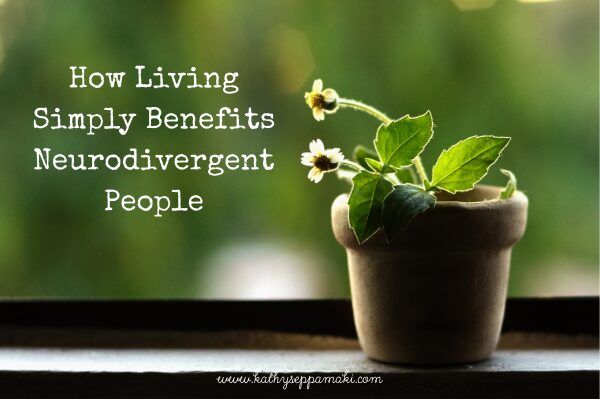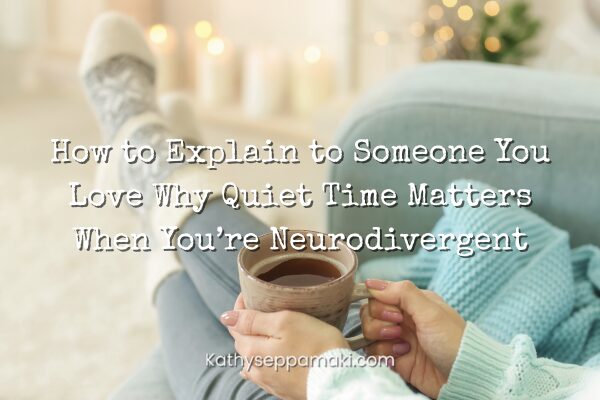The past couple of years have been challenging for me. Going through the end of perimenopause was beyond challenging, and I struggled a lot with debilitating symptoms. One thing that happened was that my changing hormones exacerbated a neurodiverse brain that I didn’t even know I had. Only this year did I discover that I most likely have both ADHD and autism (AuDHD). I do not have a formal diagnosis for either at this time. But the more I research and read, the more the struggles I’ve had my whole life make sense. And I’ve discovered just how important living simply is for those who are neurodivergent.
I always considered myself highly sensitive and an empath. But never once did I expect that it was actually most likely, and an AuDHD brain that was contributing to my sensitivity. For a long time, I’ve been drawn to living simply. Now that I understand that my brain doesn’t work like most people’s, it makes a lot of sense.
So, how can living simply benefit those who are neurodivergent like me?
Less overwhelm equals more peace for those who are neurodivergent
ADHD brains tend to crave novelty but are also easily overwhelmed by too many choices, clutter, or complex tasks. I’m looking for simpler ways to fill that craving for novelty without depleting my energy.
Autistic brains often prefer routine and predictability, and can experience sensory and emotional overload from chaotic environments or social demands. I get very easily overstimulated! But having a simple environment to come home to and a simple way of living helps me not to face burnout as often
Living simply helps by minimizing decisions, reducing clutter, and creating calming routines that soothe both the chaotic ADHD energy and the sensory sensitivity of autism.
The world can be pretty chaotic for those who aren’t neurotypical. Living simply helps to mitigate the chaos of the external world, allowing those who are neurodivergent to experience far less stress and far more peace!
Executive function relief
Let’s talk about executive function for a moment. What is executive function? Executive function is the brain’s management system — it helps you plan, start, stay focused on, and finish tasks. It’s what allows you to organize your thoughts, make decisions, regulate emotions, and adapt when things change.
But those who have both ADHD and autism can come with executive dysfunction. This type of dysfunction may cause struggles with starting, organizing, and completing tasks.
For those with executive dysfunction, too many commitments, objects, or decisions can cause shutdowns or burnout.
Living simply reduces the load on the brain’s management system, making it easier to focus on fewer things and actually being able to do them.
Sensory environment control
Autistic individuals are often highly sensitive to noise, light, textures, and smells. ADHDers typically do fine with external stimulation, but may not always notice sensory input until it’s too much — then it’s too much.
A simpler, more intentional environment, including fewer stimuli, calming colors, soft lighting, and cozy fabrics, supports emotional regulation and nervous system balance. This has been important for me. I often find that after being out in the world during the day, at night, I do better when I turn off brighter overhead lights. Instead, I use fairy lights, salt lamps, and other soft lighting, which is more gentle on my nervous system.
Routine = safety
Autistic brains thrive on predictability, and ADHD brains often need routines to avoid chaos. Simplicity helps develop gentle, flexible routines that meet both needs: structure without rigidity. Think “anchor points” in your day rather than strict schedules.
More energy for what matters
With fewer distractions and less overwhelm, you can spend your energy on what actually brings you joy, purpose, and connection. That’s especially important because masking (the act of hiding traits to appear more “normal”) is exhausting. And both ADHD and autistic folks do it a lot.
Reduces burnout
Autistic burnout and ADHD burnout are real, and they often stem from sensory overload, social strain, and living in a way that doesn’t support your brain’s needs. Simpler living helps you recover from and prevent burnout by giving you more control and gentleness in daily life.
What “living simply” can look like:
-
A decluttered, cozy home with only the things you love or need
-
Clear routines and checklists
-
Gentle sensory supports (weighted blankets, noise-canceling headphones, calming scents)
-
Minimal social obligations (and guilt-free time alone)
-
Focus on fewer, more meaningful projects
-
Saying “no” more often — without guilt
Most people who are neurodivergent find that a simpler way of living helps them to thrive.




